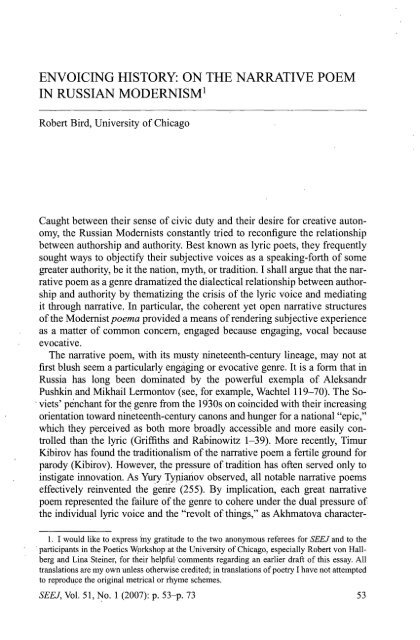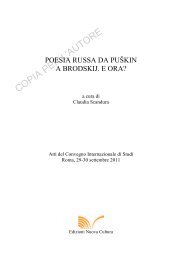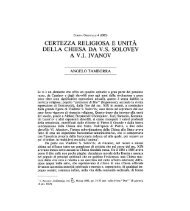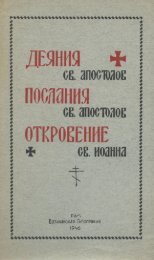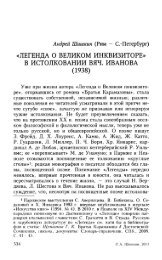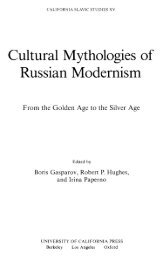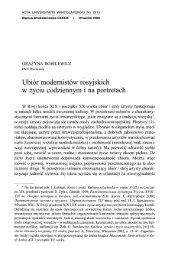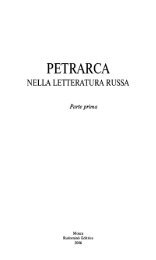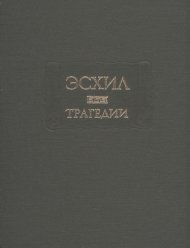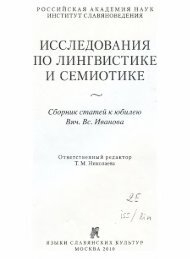Robert Bird. Envoicing History: On the Narrative Poem in Russian ...
Robert Bird. Envoicing History: On the Narrative Poem in Russian ...
Robert Bird. Envoicing History: On the Narrative Poem in Russian ...
You also want an ePaper? Increase the reach of your titles
YUMPU automatically turns print PDFs into web optimized ePapers that Google loves.
ENVOICING HISTORY: ON THE NARRATIVE POEMIN RUSSIAN MODERNISM 1<strong>Robert</strong> <strong>Bird</strong>, University of ChicagoCaught between <strong>the</strong>ir sense of civic duty and <strong>the</strong>ir desire for creative autonomy,<strong>the</strong> <strong>Russian</strong> Modernists constantly tried to reconfigure <strong>the</strong> relationshipbetween authorship and authority. Best known as lyric poets, <strong>the</strong>y frequentlysought ways to objectify <strong>the</strong>ir subjective voices as a speak<strong>in</strong>g-forth of somegreater authority, be it <strong>the</strong> nation, myth, or tradition. I shall argue that <strong>the</strong> narrativepoem as a genre dramatized <strong>the</strong> dialectical relationship between authorshipand authority by <strong>the</strong>matiz<strong>in</strong>g <strong>the</strong> crisis of <strong>the</strong> lyric voice and mediat<strong>in</strong>git through narrative. In particular, <strong>the</strong> coherent yet open narrative structuresof <strong>the</strong> Modernist poema provided a means of render<strong>in</strong>g subjective experienceas a matter of common concern, engaged because engag<strong>in</strong>g, vocal becauseevocative.The narrative poem, with its musty n<strong>in</strong>eteenth-century l<strong>in</strong>eage, may not atfirst blush seem a particularly engag<strong>in</strong>g or evocative genre. It is a form that <strong>in</strong>Russia has long been dom<strong>in</strong>ated by <strong>the</strong> powerful exempla of AleksandrPushk<strong>in</strong> and Mikhail Lermontov (see, for example, Wachtel 119-70). The Soviets'penchant for <strong>the</strong> genre from <strong>the</strong> 1930s on co<strong>in</strong>cided with <strong>the</strong>ir <strong>in</strong>creas<strong>in</strong>gorientation toward n<strong>in</strong>eteenth-century canons and hunger for a national "epic,"which <strong>the</strong>y perceived as both more broadly accessible and more easily controlledthan <strong>the</strong> lyric (Griffiths and Rab<strong>in</strong>owitz 1-39). More recently, TimurKibirov has found <strong>the</strong> traditionalism of <strong>the</strong> narrative poem a fertile ground forparody (Kibirov). However, <strong>the</strong> pressure of tradition has often served only to<strong>in</strong>stigate <strong>in</strong>novation. As Yury Tyniariov observed, all notable narrative poemseffectively re<strong>in</strong>vented <strong>the</strong> genre (255). By implication, each great narrativepoem represented <strong>the</strong> failure of <strong>the</strong> genre to cohere under <strong>the</strong> dual pressure of<strong>the</strong> <strong>in</strong>dividual lyric voice and <strong>the</strong> "revolt of th<strong>in</strong>gs," as Akhmatova character-1. I would like to express my gratitude to <strong>the</strong> two anonymous referees for SEEJ and to <strong>the</strong>participants <strong>in</strong> <strong>the</strong> Poetics Workshop at <strong>the</strong> University of Chicago, especially <strong>Robert</strong> von Hallbergand L<strong>in</strong>a Ste<strong>in</strong>er, for <strong>the</strong>ir helpful- comments regard<strong>in</strong>g an earlier draft of this essay. Alltranslations are my own unless o<strong>the</strong>rwise credited; <strong>in</strong> translations of poetry I have not attemptedto reproduce <strong>the</strong> orig<strong>in</strong>al metrical or rhyme schemes.SEEJ, Vol. 51, No. 1 (2007): p. 53-p. 73 53
ized <strong>the</strong> orig<strong>in</strong> of her <strong>Poem</strong> without a Hero [<strong>Poem</strong>a bez geroia, 1940-1965],borrow<strong>in</strong>g an image from Vladimir Mayakovsky: A Tragedy (Akhmatova 3:215; Maiakovskii 1: 163). In <strong>the</strong> narrative poem <strong>the</strong> lyric voice comes <strong>in</strong>to contentionwith a narrative world. When <strong>the</strong> narrative poem mimics liv<strong>in</strong>g voices,it does so not to enforce repetition of <strong>the</strong> author's voice by <strong>the</strong> reader (as <strong>in</strong> <strong>the</strong>lyric), but to enable <strong>the</strong> reader's own vocalization.The dom<strong>in</strong>ant role of voice <strong>in</strong> <strong>the</strong> narrative poem is supported by its persistentassociation with <strong>the</strong> oral tradition and oral performance. Compared to <strong>the</strong>novel, <strong>in</strong> <strong>the</strong> <strong>Russian</strong> literary tradition <strong>the</strong> narrative poem has sometimes beenregarded as a "naïve" narrative which, by allow<strong>in</strong>g for memorization andrecitation, ga<strong>the</strong>red communities of listeners and cultivated a common culturalconsciousness (e.g. Dostoevskii 29/1: 39, 41-42). In one typical chrestomathymeant for communal recitation by "a wide circle of readers <strong>in</strong> <strong>the</strong> Soviet village,"we read, "preference was given to narrative verses as those most easilyunderstood by listeners" (Bulgakov 384). These characteristics make <strong>the</strong> nar-'rative poem a central genre <strong>in</strong> milieux far beyond <strong>the</strong> school and <strong>the</strong> villagehall. Locked <strong>in</strong> a packed tra<strong>in</strong> car en route to her Siberian labor camp, <strong>the</strong>writer Evgenia G<strong>in</strong>zburg calmed her fellow deportees by recit<strong>in</strong>g Pasternak'sLieutenant Schmidt [Leitenant Shmidt, 1927] and Pushk<strong>in</strong>'s House <strong>in</strong> Kolomna[Domik V Kolomne, 1830] by heart (G<strong>in</strong>zburg 175-76, 198 and passim). AleksandrSolzhenitsyn turned to <strong>the</strong> poema <strong>in</strong> <strong>the</strong> labor camps <strong>in</strong> part because hehad no paper and <strong>the</strong> verses could be memorized and counted with matchsticksor prayer beads (Solzhenitsyn 3: 104). Most famously, Akhmatova's Requiem[.Rekviem, 1935-1940] was recorded only <strong>in</strong> <strong>the</strong> memory of friends because itwas too dangerous to be written down (see Chukovskaia 1: 73; Cavanagh).Thus <strong>the</strong> same orality which makes <strong>the</strong> narrative poem a site of national ritualhas also been a factor <strong>in</strong> its cont<strong>in</strong>ual volatility and its suitability for revolutionaryperiods. It is <strong>the</strong> genre that most fits Wesl<strong>in</strong>g and Slawek's def<strong>in</strong>itionof <strong>the</strong> "literary voice" as that which "simultaneously affirms writ<strong>in</strong>g and putsit <strong>in</strong>to question" (3). Like <strong>the</strong> dramatic monologue, exemplified by <strong>Robert</strong>Brown<strong>in</strong>g's The R<strong>in</strong>g and <strong>the</strong> Book, "[i]t is a genre we value for <strong>the</strong> way itbr<strong>in</strong>gs to light and stages as a cultural problem <strong>the</strong> desire for an impossiblevocal text" (Kreilkamp 157). The narrative poem is nei<strong>the</strong>r a written lyricwhose authority lies <strong>in</strong> <strong>the</strong> au<strong>the</strong>nticity of <strong>the</strong> authorial voice nor an oral epicwhere <strong>the</strong> author claims <strong>the</strong> authority to speak as "we," but a text where <strong>the</strong><strong>in</strong>dividual author confronts <strong>the</strong> possibility of <strong>the</strong> "we" com<strong>in</strong>g to voice at all.The formal and functional malleability of <strong>the</strong> narrative poem is reflected <strong>in</strong><strong>the</strong> failure of our attempts to describe it. It has been common to see Pushk<strong>in</strong>'smature narrative poems (<strong>in</strong>clud<strong>in</strong>g Evgenii <strong>On</strong>eg<strong>in</strong>) as <strong>the</strong> fruit of his creativetrajectory from <strong>the</strong> lyric to <strong>the</strong> epic. The dist<strong>in</strong>ction has also been broadly appliedto <strong>the</strong> resurgence of <strong>the</strong> narrative poem <strong>in</strong> <strong>Russian</strong> Modernist poetry,which, as Vladimir Markov has written, "started lyrically and ended epically"(1962, 36). V. Piskunov has def<strong>in</strong>ed <strong>the</strong> Modernists' "lyrical impressionism"
precisely <strong>in</strong> terms of <strong>the</strong>ir contradictory "aspiration towards a new epic syn<strong>the</strong>sis,a monumental scale of generalization, and a 'symphonic clairvoyance"'(23). Andrei Bely made <strong>the</strong> same observation about Soviet literature <strong>in</strong> 1932,not<strong>in</strong>g an "explosion of <strong>the</strong> lyric" <strong>in</strong> <strong>the</strong> immediate aftermath of <strong>the</strong> revolutionand welcom<strong>in</strong>g <strong>the</strong> first signs of a "proletarian epic" or "production epic"which would negotiate <strong>the</strong> stormy waters "between <strong>the</strong> Scylla of <strong>the</strong> 'documentarysketch' and <strong>the</strong> Charybdis of merely lyric 'superstructures'" (1932b,230, 233). Never<strong>the</strong>less, lyric and epic types of discourse have not alwaysbeen seen as polar opposites, and it was not uncommon for <strong>Russian</strong> Moderniststo characterize <strong>the</strong>ir narrative poems as a mixed, "lyrico-epic" mode.As late as 1935 Sergei Tretiakov was still seek<strong>in</strong>g to def<strong>in</strong>e a "lyrical epic" forSoviet literature, <strong>in</strong>sofar as "<strong>the</strong> command given to reality can only be completelypersuasive if it is colored by <strong>the</strong> most profound personal <strong>in</strong>terest of <strong>the</strong>author, by his greatest subjective tension" (317). Thanks to this dual nature,even as it became <strong>the</strong> site of a ritualistic rehearsal of literary models <strong>the</strong> narrativepoem rema<strong>in</strong>ed a key locus of narrative <strong>in</strong>novation, responsive to developments<strong>in</strong> o<strong>the</strong>r genres of writ<strong>in</strong>g and even o<strong>the</strong>r art forms. This malleabilityconfounded <strong>the</strong> Formalists' attempts to fix <strong>the</strong> dist<strong>in</strong>ction between <strong>the</strong> narrativepoem and <strong>the</strong> novel as between poetry and prose, especially <strong>in</strong> such lim<strong>in</strong>alcases as Pushk<strong>in</strong>'s "novel <strong>in</strong> verse" Evgenii <strong>On</strong>eg<strong>in</strong> or Bely's rhythmicalnovels. 2 In <strong>the</strong> twentieth century <strong>the</strong> label poema became attached to dramas(Nikolai Pogod<strong>in</strong>'s <strong>Poem</strong> of an Axe [<strong>Poem</strong>a о topore], 1930), non-fiction (A.Makarenko's Pedagogical <strong>Poem</strong> [.Pedagogicheskaia poema], 1935), tracts ofliterary <strong>the</strong>ory (Andrei Bely's Glossolalia, 1917), and films, both speak<strong>in</strong>g(Aleksandr Dovzhenko and Yulia Solntseva's <strong>Poem</strong> of <strong>the</strong> Sea [<strong>Poem</strong>a оmore], 1958) and silent (Evgeny Cherviakov's The Girl from <strong>the</strong> Distant River[Devushka s dalekoi reki: poema], 1927). What unites most of <strong>the</strong>se exemplais not any s<strong>in</strong>gle formal or <strong>the</strong>matic feature, but ra<strong>the</strong>r a particular k<strong>in</strong>d of narrativewhich rema<strong>in</strong>s closely aligned to <strong>the</strong> author's subjective or lyrical perspective.In short, <strong>the</strong> poema is a narrative where lyric and epic discourse convergeand where, <strong>in</strong> my terms, a voice confronts <strong>the</strong> world.While mak<strong>in</strong>g a mockery of <strong>the</strong> traditional genre classifications, <strong>the</strong>se descriptionsconsistently support a def<strong>in</strong>ition of <strong>the</strong> poema as a narrative where<strong>the</strong> voice is enworlded and <strong>the</strong> world is envoiced. At <strong>the</strong> heart of this essay isa concept of voice <strong>in</strong> which <strong>the</strong> physical act of speak<strong>in</strong>g is <strong>in</strong>extricable fromless tangible issues of personal and social identity. With its connotations ofprotest and assent, voice has been perhaps <strong>the</strong> most sensitive register of historicalchange <strong>in</strong> Russia (cf. <strong>the</strong> use of glasnost\ "envoicedness," to denotepolitical liberalization). It is, after all, only <strong>in</strong> speak<strong>in</strong>g that <strong>the</strong> self composes2. In 1924 Tynianov declared Bely's rhythmic prose "riot very productive" (159). However,as I quote below, Bely himself stated that he published his f<strong>in</strong>al novel as prose only to savespace. <strong>On</strong> <strong>the</strong> Formalists' classifications of Bely see Keys 58-61.
itself as a self, but at <strong>the</strong> same time, by presuppos<strong>in</strong>g both speaker and addressee,<strong>the</strong> voice grounds <strong>the</strong> self <strong>in</strong> a community which constra<strong>in</strong>s <strong>in</strong>dividualidentity The voice thus <strong>in</strong>stantiates <strong>the</strong> <strong>in</strong>teraction between self and community,whe<strong>the</strong>r this <strong>in</strong>teraction be coercive or emancipatory. The fact thatvoice is <strong>the</strong> locus at which <strong>the</strong> self <strong>in</strong>tervenes <strong>in</strong> <strong>the</strong> world has made it a centralconcept <strong>in</strong> modern aes<strong>the</strong>tics, from Bakht<strong>in</strong>'s concern for polyglossia anddialogue to Althusser's concept of <strong>in</strong>terpellation and Derrida's grammatology(for recent analyses see Wesl<strong>in</strong>g and Slawek; Kreilkamp; Dolar). My argumentrests on <strong>the</strong> unique ability of narrative not only to capture voices butalso to evoke a new voice by del<strong>in</strong>eat<strong>in</strong>g an <strong>in</strong>determ<strong>in</strong>ate discursive spacewhich requires completion or composition by <strong>the</strong> reader.1. Speak<strong>in</strong>g <strong>in</strong> tongues<strong>On</strong>e of <strong>the</strong> credos of French Symbolism was Paul Verla<strong>in</strong>e's avuncular declaration,"De la musique avant toute chose" (326-27), which was taken to acharacteristically absurd extreme by some <strong>Russian</strong> Modernists. The youngAndrei Bely debuted <strong>in</strong> 1902 with a full-blown Symphony (billed as his "second,"no less), which sacrificed narrative clarity to a rhythmic flow of words(Belyi 1991, 89-193). The genre failed to catch on beyond <strong>the</strong> author's immediatecircle, but Bely's symphonic writ<strong>in</strong>g was highly <strong>in</strong>fluential, both for<strong>the</strong> narrative poem and for prose genres. In this section I shall contrast Bely'slyricization of prose to <strong>the</strong> narrativization of lyric poetry evident <strong>in</strong> TheTwelve [Dvenadtsat', 1918], <strong>the</strong> crown<strong>in</strong>g masterpiece of Bely's sometimefriend and fellow Symbolist Aleksandr Blok, which turned a basically musicalsource <strong>in</strong>to a trenchant but complex narrative structure. The tensile narrativethat resulted from this clash of lyric voice and history has proved to beone of <strong>the</strong> most engaged works of modern literature, precisely because, <strong>in</strong>steadof project<strong>in</strong>g <strong>the</strong> author's voice <strong>in</strong>to and onto <strong>the</strong> world, it created anopen narrative space with<strong>in</strong> which readers were free to compose and exercise<strong>the</strong>ir own voices.Bely labeled his 1917 book Glossolalia "a narrative poem about sound"and even considered it his "most successful narrative poem," although itwould by most measures appear to be a work of <strong>the</strong>oretical poetics <strong>in</strong> prose,albeit Bely's idiosyncratic rhythmic prose (2002,4). Bely's ma<strong>in</strong> argument, ifan argument it be, was that sound and image <strong>in</strong> art were "gestures" towards atranscendent reality which always rema<strong>in</strong>ed <strong>in</strong>visible: "<strong>the</strong> characteristic ofsound is a h<strong>in</strong>t: <strong>the</strong> mean<strong>in</strong>g of my exposition is that attention notes someth<strong>in</strong>gbeyond <strong>the</strong> image; all images are landmarks; and proceed<strong>in</strong>g past <strong>the</strong>m(not accept<strong>in</strong>g <strong>the</strong>m) illum<strong>in</strong>es <strong>the</strong> subconscious of sound" (104). Sound is amere "ornament" which arises on <strong>the</strong> surface of <strong>the</strong> world like a "crust," like<strong>the</strong> "flesh of our thought" (115). Non-representational and basically contentless,<strong>the</strong>se verbal ornaments can be "read" ra<strong>the</strong>r as <strong>the</strong> great Theosophistsdeciphered <strong>the</strong> universe; Bely's own read<strong>in</strong>gs tended to resemble a game of
free association. A recent commentator advises us that if we are "<strong>in</strong>capable ofunderstand<strong>in</strong>g this book," we should at least "try to enjoy it as one enjoys awork of art,—not to read it, but to listen as one listens to a virtuoso viol<strong>in</strong>istor pianist" (Svas'ian 143). Perhaps that is sound advice, but it suggests thatBely's writ<strong>in</strong>g was more a vehicle for his voice than <strong>the</strong> locus of any k<strong>in</strong>d ofmean<strong>in</strong>g. Here "symphony" has more to do with an orchestrated unanimitythan with <strong>the</strong> etymological sense of improvisational polyphony.It was Bely's use of language as vocal ornament, more than his opaquestorytell<strong>in</strong>g and two-dimensional characterization, which rendered his narrativepoems and novels anti<strong>the</strong>tical to narrative. Instead of cultivat<strong>in</strong>g modes ofattend<strong>in</strong>g to <strong>the</strong> world, Bely's ornamental prose <strong>in</strong>curs near-hypnosis by meansof repetitive, textureless rhythms. "My prose," Bely claimed <strong>in</strong> his last novel,"is not prose at all, but a narrative poem <strong>in</strong> verse (anapestic); it is pr<strong>in</strong>ted asprose simply to save space" (1932a, 11). Bely's prose <strong>the</strong>refore becomes anoral exercise ak<strong>in</strong> to ventriloquism: "I write not to be read by one's eyes, butfor a reader who <strong>in</strong>wardly pronounces my text" (9). The fashion started byBely for rhythmic prose was widely derided by critics as diverse as ViacheslavIvanov and Yury Tynianov (Ivanov 4: 639-40; Tynianov 159), however to acerta<strong>in</strong> extent Bely was simply tak<strong>in</strong>g to a logical extreme <strong>the</strong> widely sharedModernist notion of lyric poetry as <strong>the</strong> basis of all verbal art, accord<strong>in</strong>g towhich <strong>the</strong> poet was a univocal speak<strong>in</strong>g forth of <strong>the</strong> <strong>in</strong>ner truth of th<strong>in</strong>gs.Although Blok also l<strong>in</strong>ked <strong>the</strong> genesis of his narrative poem The Twelve toa musical <strong>in</strong>spiration, its narrative structure is more than a mere vehicle forproject<strong>in</strong>g voices <strong>in</strong> an act of ventriloquism. The Twelve tells <strong>the</strong> story of adetachment of Red Army soldiers who, <strong>in</strong> <strong>the</strong> chaos of revolutionary Petrograd,march past such social enemies as a bourgeois and a weak-kneed orator,consign<strong>in</strong>g <strong>the</strong>m all to <strong>the</strong> dusty blizzard. A sub-plot concerns <strong>the</strong> (non-Bolshevik) soldier Vanka and <strong>the</strong> prostitute Katka, who are mercilessly shotdown by Red-Guardsman Petka, Katka's erstwhile lover. The twelve cont<strong>in</strong>ue<strong>the</strong>ir <strong>in</strong>exorable march under a blood-red flag, shoot<strong>in</strong>g ahead of <strong>the</strong>mselves,when <strong>the</strong>re appears up ahead, "unharmed by <strong>the</strong> bullets," "under a red banner,"Jesus Christ.In some respects The Twelve reaches back beyond Bely's experiments to <strong>the</strong>tradition of Pushk<strong>in</strong>'s The Bronze Horseman [Mednyi vsadnik, 1833]. As <strong>in</strong> <strong>the</strong>latter, major events of national proportions are juxtaposed to a victimized <strong>in</strong>dividual,who is mercilessly crushed under <strong>the</strong> iron heel of rampant history(see Blok 5: 316, 348). The loose narrative form of The Twelve reflects <strong>the</strong>fragmentary structure of works which early Modernists Valéry Briusov andKonstant<strong>in</strong> Balmont called lyrical narrative poems [liricheskaia poema] (fordiscussion, see Markov 1987), which were sometimes devoid of overt narrativeprogression. Although hardly dist<strong>in</strong>guishable from a cycle of lyric poems,<strong>the</strong> very denotation of genre established a suspenseM horizon of expectationwhich, suspended and shifted <strong>in</strong> every l<strong>in</strong>e, supports a skeletal narrative. As
<strong>the</strong> Sibyll<strong>in</strong>e poet becomes a narrator, <strong>the</strong> reader enters a free <strong>in</strong>terpretivespace. The disjo<strong>in</strong>ted plot is a key means of actively engag<strong>in</strong>g <strong>the</strong> reader tocomplete <strong>the</strong> narrative and to cultivate an appropriate comportment or modeof attention. Very often <strong>the</strong> narrative framework comments upon <strong>the</strong> work it iselicit<strong>in</strong>g from <strong>the</strong> reader; <strong>in</strong> addition to referr<strong>in</strong>g to its characters, for <strong>in</strong>stance,<strong>the</strong> title of The Twelve also refers to <strong>the</strong> poem's twelve-part structure, whichmimics <strong>the</strong> relentless march of revolution with a drumbeat rhythm and, like <strong>the</strong>blizzard, swells with <strong>the</strong> words, slogans, and rhythms of <strong>the</strong> revolutionarystreet. 3 This may well be a poem about revolutionary poetry.A self-referential <strong>in</strong>terpretation of <strong>the</strong> title is not far-fetched. From his earliestcritical statements Blok (like many <strong>Russian</strong> Modernists) had privileged <strong>the</strong>lyric over <strong>the</strong> epic (i.e., narrative) for its "lofty melody and ancient rhythm,under which <strong>the</strong> cradle of epochs and nations slowly rocks" (7: 62). In <strong>the</strong>aftermath of <strong>the</strong> 1905 revolution, Blok had affirmed <strong>the</strong> "<strong>in</strong>estimable riches"of <strong>the</strong> lyrical element [stikhiia], which nourishes "<strong>the</strong> fearless and experiencedth<strong>in</strong>ker, <strong>the</strong> scholar, and <strong>the</strong> social activist" (7: 62). In his essay "The Intelligentsiaand Revolution," written at <strong>the</strong> same time as The Twelve <strong>in</strong> January1918, Blok applied his old <strong>in</strong>sights to <strong>the</strong> new, far more dire situation, extoll<strong>in</strong>g<strong>the</strong> destruction of civilization as a liberation, for which <strong>the</strong> writer bearsparticular responsibility:It is not for <strong>the</strong> artist to make sure that what has been conceived [zadumano] is fulfilled, or toworry whe<strong>the</strong>r or not it is fulfilled. For <strong>the</strong> artist, everyth<strong>in</strong>g matter-of-fact, worldly and transientwill f<strong>in</strong>d its expression later, when it is burnt up <strong>in</strong> life. Those of us who survive [...] willturn out to be <strong>the</strong> masters of countless spiritual treasures. Probably only a new genius, Pushk<strong>in</strong>'sArion, will be able to take possession of <strong>the</strong>m: he, "cast out by a wave on <strong>the</strong> shore," will s<strong>in</strong>ghis "former hymns" and dry his "wet robes" "<strong>in</strong> <strong>the</strong> sun, under a cliff."The task of <strong>the</strong> artist is to see what has been conceived, to listen to <strong>the</strong> music which roars <strong>in</strong><strong>the</strong> "air ripped apart by <strong>the</strong> w<strong>in</strong>d." (Blok 5: 398-99)Shar<strong>in</strong>g some of <strong>the</strong> imagery and vocabulary of this essay, The Twelve can beseen as Blok's attempt to engage <strong>the</strong> world not by means of political commentor action, nor by impos<strong>in</strong>g a rigid pattern onto observed events, but preciselyby "listen<strong>in</strong>g to <strong>the</strong> music of <strong>the</strong> revolution" (5: 405). The effect, as Blok suggested<strong>in</strong> "The Intelligentsia and Revolution," would be <strong>the</strong> awaken<strong>in</strong>g ofnew "creative forces"—new words—<strong>in</strong> millions of silent "unenlightened"people: "<strong>in</strong> <strong>the</strong> future <strong>the</strong>y may utter such words as our tired, stale and bookishliterature has long s<strong>in</strong>ce failed to utter" (406). The Twelve was a transitionalutterance which might elicit new voices without dictat<strong>in</strong>g <strong>the</strong>ir contentor tone. Blok's reluctance to impose his own voice and <strong>in</strong>tonation on <strong>the</strong> narrativeexpla<strong>in</strong>s why he refused to declaim The Twelve despite its popularity.3. <strong>On</strong>e of Blok's manuscript fragments bears <strong>the</strong> title: "The Twelve (men and poems)" (Blok5: 306). Of course, "<strong>the</strong> twelve" also evokes connotations of <strong>the</strong> twelve apostles and of <strong>the</strong>twelve thieves (from <strong>the</strong> <strong>Russian</strong> folk song derived from Nikolai Nekrasov's poetry), aboutwhich Blok also left textual evidence; see Blok 5: 307-9.
In part as a result of this authorial reticence, <strong>the</strong> work has elicited markedlydivergent <strong>in</strong>terpretations. The narrative limits itself to establish<strong>in</strong>g a horizonof expectation aga<strong>in</strong>st which <strong>the</strong> revolution can be experienced, envoiced and<strong>in</strong>terpreted by <strong>the</strong> reader.Read<strong>in</strong>g Blok's essay toge<strong>the</strong>r with The Twelve, one beg<strong>in</strong>s to see how thisfiction relies on <strong>in</strong>tricate strategies of distanciation <strong>in</strong> order to engage with <strong>the</strong>world. To be sure, <strong>the</strong> poem directly mimics revolutionary sounds and images.With<strong>in</strong> <strong>the</strong> first part alone mimetic elements <strong>in</strong>clude <strong>the</strong> bitterly cold wea<strong>the</strong>r,<strong>the</strong> slogan "All power to <strong>the</strong> Constituent Assembly," <strong>the</strong> rhetorical response of<strong>the</strong> <strong>in</strong>tellectual (several real-life models for him have been suggested), andeven <strong>the</strong> shortage of cloth. More to <strong>the</strong> po<strong>in</strong>t, <strong>the</strong> work <strong>in</strong>corporates severalrecognizable songs of <strong>the</strong> pre-revolutionary era, mimick<strong>in</strong>g <strong>the</strong> polyphony oreven cacophony of <strong>the</strong> age (Petrovskii). The poem's narrative also reproducesa series of events which may well have been part of contemporary urban legend,and its sections mimetically reproduce various atmospheres and moods of<strong>the</strong> street. However, on all levels <strong>the</strong> mimetic similarities are disrupted by <strong>the</strong>discont<strong>in</strong>uous and <strong>in</strong>determ<strong>in</strong>ate narrative. In many respects <strong>the</strong> poem seems<strong>in</strong>tended less to reproduce <strong>the</strong> reality of <strong>the</strong> street than to suspend it <strong>in</strong> a stateof stutter<strong>in</strong>g half-completion. And <strong>the</strong>n, of course, <strong>the</strong>re is <strong>the</strong> enigmatic appearanceat <strong>the</strong> end of Jesus Christ, whose name is given <strong>in</strong> an archaic spell<strong>in</strong>gaccepted only by <strong>the</strong> schismatic Old Believers. More <strong>in</strong>terested <strong>in</strong> captur<strong>in</strong>g<strong>the</strong> revolution's mood than <strong>in</strong> <strong>in</strong>terpret<strong>in</strong>g its significance, The Twelve describes<strong>the</strong> transformation of <strong>the</strong> fragmented words of <strong>the</strong> revolution <strong>in</strong>to itssupra-rational music, i.e. a coherent but <strong>in</strong>conclusive narrative. Blok projects<strong>the</strong> possibility of a coherent narrative of <strong>the</strong> revolution only <strong>in</strong> order to deferit at every level, from metaphysics right down to spell<strong>in</strong>g. <strong>On</strong>e sees why BorisEikhenbaum described The Twelve as "<strong>the</strong> explosion of its own system, tragicfor symbolism and for <strong>the</strong> poet himself" (1986, 441).The elusive valence of <strong>the</strong> poem's powerful charge is confirmed by earlywitnesses to <strong>the</strong> poem's impact <strong>in</strong> revolutionary Russia. In her autobiographicalnovel The Change [Peremena, 1923] Marietta Shag<strong>in</strong>ian described <strong>the</strong>reception of The Twelve dur<strong>in</strong>g <strong>the</strong> Civil War <strong>in</strong> 1921, <strong>in</strong> an area <strong>the</strong>n occupiedby <strong>the</strong> Whites:When <strong>the</strong> words of Blok's The Twelve first sounded <strong>in</strong> our small room, hav<strong>in</strong>g been smuggledto us through <strong>the</strong> cordons, our meet<strong>in</strong>g stood to its feet, astounded by a sharp excitement [...].The Twelve was a spark passed from one to ano<strong>the</strong>r as a ra<strong>in</strong>bow that has arisen <strong>in</strong> <strong>the</strong> sky, say<strong>in</strong>gto <strong>the</strong> soul:"Don't be afraid! You are right. Love has gone over to those who are be<strong>in</strong>g called aggressors.I pledge this to you as <strong>the</strong> most beloved <strong>Russian</strong> poet..." (Shag<strong>in</strong>ian 1930, 423-24; cf. Shag<strong>in</strong>ian1980, 609-10; Blok 5: 350-52)The poem was literally "contraband" to be concealed from its enemies, who,like Herod, would smo<strong>the</strong>r it <strong>in</strong> <strong>the</strong> manger. Hav<strong>in</strong>g reached its purported addressees,<strong>the</strong> poem brought sound and light to <strong>the</strong>ir underground. None<strong>the</strong>-
less, its nourish<strong>in</strong>g power for revolutionaries could not compromise its abilityto engage with o<strong>the</strong>r populations, and by Blok's death <strong>in</strong> 1921 <strong>the</strong> poemwas also be<strong>in</strong>g read as opposed to Bolshevism and prophetic of <strong>the</strong> collapseof its ideals <strong>in</strong> violence and greed (Tolstoi). Even Leon Trotsky, for example,while call<strong>in</strong>g The Twelve Blok's "most important work," attributed to it an essentiallynegative significance, as "<strong>the</strong> swan song of <strong>the</strong> <strong>in</strong>dividualistic artthat went over to <strong>the</strong> Revolution" (119). Accord<strong>in</strong>g to Trotsky, Blok associated<strong>the</strong> positive elements of revolution with Christ only because this was <strong>the</strong>highest "bless<strong>in</strong>g" available to him with<strong>in</strong> <strong>the</strong> framework of pre-revolutionaryculture, whereas <strong>the</strong> revolution has brought fundamentally new criteria(124). Therefore, Trotsky concludes, "Blok is not one of ours, but he reachedtowards us" (125). As Shklovsky recognized, <strong>the</strong> poem's ability to wear variouspolitical tags is a function of its suspended syn<strong>the</strong>tic form, which"reaches" towards <strong>the</strong> actual political reality without adopt<strong>in</strong>g a specifiablestance with<strong>in</strong> it (Shklovsky 1990, 170-71).While <strong>the</strong> <strong>in</strong>terpretation of Blok's poem has been shaped by extra-aes<strong>the</strong>ticfactors from sales to political <strong>in</strong>fluence, <strong>the</strong> source and character of its impactis perhaps best gauged by its resonance with<strong>in</strong> <strong>the</strong> fictional realm, where itquickly proved as pervasive as Pushk<strong>in</strong>'s Bronze Horseman. In 1920 SergeiGorodetsky expressed <strong>the</strong> hope that Blok's The Twelve would lay <strong>the</strong> foundationfor a new art of <strong>the</strong> masses, "a meet<strong>in</strong>g of old Pushk<strong>in</strong>ian and new proletarianculture" (Blok 5: 348). Blok certa<strong>in</strong>ly set a new standard for <strong>the</strong> narrativepoem, <strong>in</strong>stigat<strong>in</strong>g a widespread anticipation of "<strong>the</strong> formation of a newpoema" as Eikhenbaum put it (1924, 9). New k<strong>in</strong>ds of poema did arise at <strong>the</strong>hands of relentless <strong>in</strong>novators like Mayakovsky, <strong>in</strong> part under <strong>the</strong> pressure ofnew technologies of transmission and projection, but with each <strong>in</strong>novation<strong>the</strong> genre cont<strong>in</strong>ued to cohere as a specific locus of engagement, where <strong>the</strong>poet's voice composes itself <strong>in</strong>to an open narrative framework, <strong>the</strong> mean<strong>in</strong>gof which is composed only <strong>in</strong> readers' voices.2. At <strong>the</strong> top of his voiceThe central role of voice <strong>in</strong> <strong>the</strong> constant <strong>in</strong>novation of <strong>the</strong> narrative poem isattested to most directly by <strong>the</strong> next great exponent of <strong>the</strong> genre after Blok,namely Mayakovsky. Mayakovsky's <strong>in</strong>itial renown was <strong>in</strong> no small part due tohis new style of declamation; his comrade-<strong>in</strong>-Futurism Vasily Kamensky describedhow, with <strong>the</strong> "mighty timbre" of his voice, "Mayakovsky declaimedmonumentally, as if ga<strong>the</strong>r<strong>in</strong>g mounta<strong>in</strong>s" (1940, 161; 1968, 186-87). Mar<strong>in</strong>aTsvetaeva called Mayakovsky "<strong>the</strong> first <strong>Russian</strong> poet-as-orator" (5: 378).Mayakovsky's voice was palpable even on <strong>the</strong> pr<strong>in</strong>ted page, thanks to his useof tonic meters (go<strong>in</strong>g aga<strong>in</strong>st <strong>the</strong> gra<strong>in</strong> of two centuries of syllabo-tonic poetry<strong>in</strong> Russia) which he pr<strong>in</strong>ted <strong>in</strong> terraced or "stepladder" arrangement. Theeffect, accord<strong>in</strong>g to Bely, was a "liv<strong>in</strong>g verse, which moves abreast withspeeded-up time and which strives to express its own <strong>in</strong>tonation" (Janecek
247). Thanks to Mayakovsky's embrace of new technologies of record<strong>in</strong>g andbroadcast, his voice became one of <strong>the</strong> first to be widely recognizable to <strong>the</strong><strong>Russian</strong> ear, and he frequently <strong>the</strong>matized and even personified his voice <strong>in</strong>such narrative poems as At <strong>the</strong> Top of My Voice [Vo ves' golos]:Но я / себя / смирял, / становясьна горло / собственной песне.Слушайте, / товарищи потомки,агитатора, / горлана-главаря.Заглуша / поэзии потоки,я шагну / через лирические томики,как живой / с живыми говоря. (10: 280-81)But I / restra<strong>in</strong>ed / myself / by stepp<strong>in</strong>gon <strong>the</strong> throat / of my very own songsListen, / comrade descendents,to <strong>the</strong> agitator, / <strong>the</strong> loud-mouth chief.Silenc<strong>in</strong>g / <strong>the</strong> streams of poetry,I shall step / through lyrical volumes,like a live man / speak<strong>in</strong>g to <strong>the</strong> liv<strong>in</strong>g.Not surpris<strong>in</strong>gly, Mayakovsky's death by suicide was widely perceived as atraumatic and cataclysmic fall<strong>in</strong>g silent—not so much of a poet, but of a historicalworld.The amplitude and range of Mayakovsky's hyperbolic voice empoweredhim to write on behalf of <strong>the</strong> entire Soviet populus. "150,000,000 is <strong>the</strong> nameof <strong>the</strong> author of this poem," he announces at <strong>the</strong> beg<strong>in</strong>n<strong>in</strong>g of his narrativepoem 150,000,000, which appeared on <strong>the</strong> cover of <strong>the</strong> book as both title andauthor. "150,000,000 speak with my lips" (2: 115). While V. N. Orlov describesthis work as a "polemic" with Blok's The Twelve (190), Blok did notclaim to speak for his twelve characters or for <strong>the</strong> reader's performance of <strong>the</strong>poem, whereas Mayakovsky <strong>in</strong>variably claimed <strong>in</strong>tonational authority over<strong>the</strong> content and declamation of his narratives. The presumptiveness of150,000,000 and o<strong>the</strong>r poems suggested to many that Mayakovsky viewedhis poetry as an occasion to impose his own voice on <strong>the</strong> world, just as itstonic meters seem to dictate <strong>the</strong> speed and volume of read<strong>in</strong>g. Trotsky accusedMayakovsky of "Mayakomorphism" (149). Émigré critic Konstant<strong>in</strong>Mochulsky perhaps put it best, writ<strong>in</strong>g thatA guttural, bestial o-ho-ho, a neigh<strong>in</strong>g and moo<strong>in</strong>g issues from beneath all of his words. It seemsthat <strong>the</strong> timbre of his voice, its low throaty tone engenders both <strong>the</strong> images and <strong>the</strong>mes of hisverse. [...] Mayakovsky does not roar because he rages, exposes or curses; ra<strong>the</strong>r, he seeks outobjects of his emotion <strong>in</strong> order to roar. (100)Tynianov established a historicist <strong>in</strong>terpretive framework by l<strong>in</strong>k<strong>in</strong>gMayakovsky's expansive lyrics to a revival of <strong>the</strong> "oratorical genre" of <strong>the</strong>ode (252). Roman Jakobson op<strong>in</strong>ed that, even when Mayakovsky attempts "abloody Iliad of <strong>the</strong> Revolution," "what appears is not an epic but a heroic lyricon a grand scale, offered 'at <strong>the</strong> top of his voice'" (274). Gerald Janecek hasremarked that <strong>the</strong> "lesenka [stepladder] and o<strong>the</strong>r such devices were attemptsby <strong>the</strong> author as author to fix <strong>the</strong> limits of allowable <strong>in</strong>terpretation" (244).None<strong>the</strong>less, I shall argue, <strong>the</strong> unique mean<strong>in</strong>gfulness of Mayakovsky's poetrystemmed from his will<strong>in</strong>gness ultimately to sacrifice authority over hisvoice by emplott<strong>in</strong>g it <strong>in</strong> open-ended narratives which cohere only <strong>in</strong> <strong>the</strong>ir activeappropriation by readers.
In short, far from be<strong>in</strong>g an exercise <strong>in</strong> solipsistic self-aggrandizement,Mayakovsky's poetry actually dramatized <strong>the</strong> possibility of envoic<strong>in</strong>g <strong>the</strong>world. Many Soviet critics compla<strong>in</strong>ed precisely of <strong>the</strong> constant sense of vulnerabilityand reticence <strong>in</strong> Mayakovsky's voice. For example, Shklovsky heldMayakovsky responsible "not because he shot himself, but because he stood'on <strong>the</strong> throat of his very own songs'" (Shklovskii 1934). Stra<strong>in</strong><strong>in</strong>g and break<strong>in</strong>gunder <strong>the</strong> pressure of history, Mayakovsky's voice turned <strong>the</strong> most martialpropaganda <strong>in</strong>to latent tragedy. In 150,000,000, as <strong>in</strong> o<strong>the</strong>r poems, <strong>the</strong>tragic recoil of Mayakovsky's odes unfurls from <strong>the</strong> conflation of nation,poem, and <strong>the</strong> body of <strong>the</strong> poet or lyrical hero:И вот / Россия / не нищий оборвыш, / некуча обломков, / не зданий пепел-Россия / вся / единый Иван,а рука / у него— / Нева,а пятки—каспийские степи. (2:126-27)And here Russia / is not a penniless tramp, / nota pile of fragments, / not <strong>the</strong> dust of build<strong>in</strong>gs—Russia / is all / a s<strong>in</strong>gle Ivan,And his / hand is / <strong>the</strong> Neva,and his heels are <strong>the</strong> Caspian steppes.This Ivan subsequently steps across <strong>the</strong> world to <strong>in</strong>itiate "class warfare" with<strong>the</strong> evil forces of President Woodrow Wilson and <strong>the</strong> city of Chicago. The ascentof a new sun—"Maybe / <strong>the</strong> hundredth anniversary of <strong>the</strong> October Revolution,maybe / just / an immaculately good mood"—is heralded by new voices:«Голоса людские / зверьи голоса, / рев рекввысь славословием вьем.Пойте все и все слушайте / мира торжественный реквием.[...]» (2: 161, 162)"People's voices, / beasts' voices, / <strong>the</strong> roar of riversWe weave to <strong>the</strong> heights with our praise.S<strong>in</strong>g all and listen all / to <strong>the</strong> world's solemn requiem. [...]"Various types of downtrodden now "trumpet <strong>the</strong> tid<strong>in</strong>gs of heaven today,"each <strong>in</strong> <strong>the</strong>ir own way. The unity of <strong>the</strong> poem heralds a new tomorrow whereeach will speak with equal force, a promise that is realized today <strong>in</strong> <strong>the</strong> abilityof <strong>the</strong> poet's voice, his throat even, to speak with such force.The <strong>in</strong>terchangeability of nation, <strong>in</strong>dividual, poem, body and voice make itimpossible to place Mayakovsky <strong>in</strong> a position of f<strong>in</strong>al authority or, by extension,of authorship. His allegorical narratives rema<strong>in</strong> splendidly open to newperspectives and reversals. Mayakovsky's pretense of speak<strong>in</strong>g for <strong>the</strong> millionsbecomes a tormented acknowledgement of responsibility before <strong>the</strong> millionswho will occupy his text, each envoic<strong>in</strong>g it anew. Mayakovsky's senseof martyrdom did not always sit well with Soviet critics; Shklovsky compla<strong>in</strong>edthat Mayakovsky "didn't realize that <strong>the</strong> revolution needed songs, andthat songs don't need sacrifice" (1934).If his liv<strong>in</strong>g voice encouraged polyphonic read<strong>in</strong>g, after his death it became<strong>in</strong>creas<strong>in</strong>gly monologic, especially <strong>in</strong> <strong>the</strong> hagiographical texts produced <strong>in</strong>copious quantities by members of his circle (see Shear-Urbaszewski). In hisbiographical poem Mayakovsky Beg<strong>in</strong>s [Maiakovskii nach<strong>in</strong>aetsia], Nikolai
Aseev describes his late friend's achievement as <strong>the</strong> ga<strong>the</strong>r<strong>in</strong>g of Russia <strong>in</strong>toa s<strong>in</strong>gle voice:Он также мостилвсероссийскую тинубулыжником слов, —не цветочной пыльцой,ханже и лгунуповорачивал спину,в пощечинысмаху хлеща подлецов.И понял яв черных бризантных вихрях,что в этойтревожной браваде юнцарастетвсенародныйроссийский выкрик,еще не додуманныйдо конца. (Aseev 83)Не also paved<strong>the</strong> all-<strong>Russian</strong> swampwith stones of words -not flower pollen;he turned <strong>the</strong> backsof <strong>the</strong> idle and liars,beat<strong>in</strong>g scoundrelswith slaps <strong>in</strong> <strong>the</strong>ir face.And I realized<strong>in</strong> <strong>the</strong>se black breezy stormsthat <strong>in</strong> thisyouth's anxious bravado<strong>the</strong>re growsan all-national<strong>Russian</strong> scream,albeit not thought throughto <strong>the</strong> end.After recount<strong>in</strong>g Mayakovsky's rise to prom<strong>in</strong>ence, Aseev jumps ahead to <strong>the</strong>literary polemics of <strong>the</strong> late 1920s and <strong>the</strong> story becomes one of "how slowly /uphill / is drawn <strong>the</strong> squeaky cart / of posthumous glory" (127). This is <strong>the</strong> beg<strong>in</strong>n<strong>in</strong>gof Mayakovsky's afterlife, centered upon <strong>the</strong> square that has beennamed for him <strong>in</strong> Moscow, which Aseev depicts as a more suitable monumentthan a statue. Rid<strong>in</strong>g on <strong>the</strong> bus, <strong>the</strong> public hears <strong>the</strong> "shrill / conductressscream": "Pushk<strong>in</strong> Square; Mayakovsky is next!" (129). Although <strong>the</strong> architectureis still "flat," <strong>the</strong> big "MM" of <strong>the</strong> Moscow metro, like "broad shoulders,"a gateway to <strong>the</strong> <strong>in</strong>nards of Moscow, is a sign of "<strong>the</strong> soul's new habits"(131). This makes him so close to Moscow that, Aseev avers, if you ever forgeta l<strong>in</strong>e of Mayakovsky's poetry a "hundred voices immediately rush toprompt you!" (130). Mayakovsky Square is a nexus of transportation and communicationnetworks at <strong>the</strong> center of <strong>the</strong> world's largest country, held firm byechoes of <strong>the</strong> poet's voice.Just as Mayakovsky's martyrdom rendered his voice a site of ritual commemoration,so also did Mayakovsky's style and <strong>the</strong>mes become a means ofre<strong>in</strong>forc<strong>in</strong>g literary canons. An apt example is <strong>the</strong> unf<strong>in</strong>ished poem "WhiteSea Workers" ["Belomortsy," 1934] by <strong>the</strong> young Konstant<strong>in</strong> Simonov,which tells of <strong>the</strong> re-education of thieves through forced labor at <strong>the</strong> WhiteSea-Baltic Sea Canal. The construction of <strong>the</strong> Canal <strong>in</strong> <strong>the</strong> silent North islikened to <strong>the</strong> orig<strong>in</strong>ation of a word and a voice:Люди работают справа и слева.— People work right and left.У каждого мир— / одинок / и мал, The world of each / is lonely / and smallНо начало в здешних упрямых припевах But <strong>in</strong> <strong>the</strong> stubborn refra<strong>in</strong>s around hereКрепнуть простое словоThere beg<strong>in</strong>s to streng<strong>the</strong>n <strong>the</strong> simple word:«Канал». (Simonov 132) "Canal."
Nature beg<strong>in</strong>s to speak, to moan, and to compla<strong>in</strong> at be<strong>in</strong>g violated. But graduallyman f<strong>in</strong>ds his proper voice. The trigger is an accident, when <strong>the</strong> workerssuddenly become conscious of <strong>the</strong>ir failure:вниз рванулась водаИ рухнула многопудовым морозом.И в мыслях застыло холодом льда,Как камень, тяжелое слово—поздно!(134)<strong>the</strong> water rushed downAnd crashed with a weighty frost.And <strong>in</strong> <strong>the</strong>ir thoughts <strong>the</strong>re froze with <strong>the</strong> cold of ice,Like a stone, <strong>the</strong> heavy word—too late\The day is saved by a silent old foreman who hesitantly calls <strong>the</strong> "canal soldiers"[kanaloarmeitsy] to work. The poet concludes:Читатель, / простимся на этой главе.Дай руку. / В мышцах, и в разводе плечЖарко пульсирует кровь человека,Сказавшего первую в жизни речь.Теперь прижми к его сердцу поближеПальцы обеих внимательных рукИ...—товарищ читатель, ты слышишь?Он меняется, сердца стук...И легкие работают чище,И голос звучит не так,И ветер иначе свищетВ гуле мускулистых атак... (136)Reader, / let us part at this chapter.Give me your hand. / In our muscles, <strong>in</strong> <strong>the</strong> breadth of our shouldersThere feverishly pulsates <strong>the</strong> blood of a manWho has spoken out loud for <strong>the</strong> first time <strong>in</strong> his life.Now put <strong>the</strong> f<strong>in</strong>gers of both attentive handsCloser to his heartAnd...—Comrade reader, do you hear?It's chang<strong>in</strong>g, <strong>the</strong> beat<strong>in</strong>g of his heart...And his lungs brea<strong>the</strong> more purely,And his voice sounds anew,And <strong>the</strong> w<strong>in</strong>d is whistl<strong>in</strong>g differentlyIn <strong>the</strong> humm<strong>in</strong>g of muscular attacks.Here, <strong>in</strong>stead of <strong>the</strong> narrative describ<strong>in</strong>g an open space to be filled by <strong>the</strong>reader's own voice, a character stands <strong>in</strong> for <strong>the</strong> passive reader and presentsa determ<strong>in</strong>ate pattern to be imitated. This is <strong>the</strong> poema as ventriloquism, <strong>the</strong>imposition of a voice onto <strong>the</strong> reader, cancel<strong>in</strong>g out <strong>the</strong> <strong>in</strong>determ<strong>in</strong>acy of <strong>the</strong>narrative's conclusion <strong>in</strong> an artificial unison.3. Voices of <strong>the</strong> RevolutionMayakovsky's poetry of voice was a significant factor <strong>in</strong> <strong>the</strong> push to <strong>in</strong>tegrateSoviet narrative poetry with emerg<strong>in</strong>g sound technologies such as <strong>the</strong>
gramophone and <strong>the</strong> radio, which heightened <strong>the</strong> tension between <strong>the</strong> <strong>in</strong>trovertedunivocalism of <strong>the</strong> lyric and <strong>the</strong> open engagement of <strong>the</strong> narrativepoem. 4 Mayakovsky had himself recognized <strong>the</strong> power of radio <strong>in</strong> his 1925poem "Radio-agitator":Была ль / небывалей мечта! [...] Was <strong>the</strong>re ever / a dream less unreal! [...]Как можно в Москве / читать, How can one read <strong>in</strong> Moscowа из Архангельска / слушать! And listen from / Arkhangelsk!А нынче / от вечных ночейBut now / from eternal nightsдо стран / где солнце без тени, То countries / where <strong>the</strong> sun is without shadow,в мильон / ушей слухачейInto a million listeners' earsвлезают / слова по антенне! [...] Words / crawl along <strong>the</strong> antenna! [...]А, может быть, / и такое / мы And maybe / we / will soon hearуслышим по воздуху / скоро: through <strong>the</strong> air / someth<strong>in</strong>g like this:рабочий / Америки и Чухломы A worker / of America and a worker of Chukhlomaспоются / одним хором.will jo<strong>in</strong> <strong>the</strong>ir voices / <strong>in</strong> a s<strong>in</strong>gle chorus.Чтоб шли / скорей / века без оков, So that <strong>the</strong> ages without cha<strong>in</strong>s / pass / more quickly,чтоб близилась / эта дата—So that this date / becomes nearer—бубни / миллионам / своих языков, Drum out / with your million / tongues,радио-агитатор! (13: 262-63 ) Radio-agitator!As this text suggests, and as contemporary critics compla<strong>in</strong>ed, Mayakovsky'sperformances tended to impose his voice through his texts <strong>in</strong>stead of us<strong>in</strong>g<strong>the</strong>ir narratives to foster <strong>the</strong> speech of <strong>the</strong> masses (see Viach. Em.; Ioffe;Bernshte<strong>in</strong>). This was undesirable for both ideological and aes<strong>the</strong>tic reasons;<strong>in</strong> fact, <strong>the</strong> problem of radio poetry demonstrated <strong>the</strong> <strong>in</strong>separability of ideologyand aes<strong>the</strong>tics. Thus, anachronistic styles of read<strong>in</strong>g were labeled ascounter-revolutionary wreck<strong>in</strong>g [vreditel'stvo] because <strong>the</strong>y "<strong>in</strong>spire[d], <strong>in</strong>steadof revolutionary enthusiasm, <strong>the</strong> desire to turn off <strong>the</strong> radio as soon aspossible" (Goncharova). It was gradually recognized that <strong>the</strong> key to engag<strong>in</strong>glisteners with <strong>the</strong> sounds com<strong>in</strong>g out of a mechanical box was not <strong>in</strong> bombard<strong>in</strong>g<strong>the</strong>m with <strong>the</strong> voices of authors or <strong>the</strong>atrical stars, but <strong>in</strong> <strong>in</strong>volv<strong>in</strong>g<strong>the</strong>m <strong>in</strong> narrative schemes while leav<strong>in</strong>g <strong>the</strong>m free to envision and embody—yes, even to envoice—<strong>the</strong> worlds <strong>the</strong>y represented.A case <strong>in</strong> po<strong>in</strong>t is <strong>the</strong> radio adaptation of Eduard Bagritsky's narrativepoem Meditation about Opanas [Duma pro Opanasa, 1926], <strong>in</strong> which twodeaths—of <strong>the</strong> Communist Kogan and <strong>the</strong> anarchist Opanas—are contrasted<strong>in</strong> dist<strong>in</strong>ctly stylized lyrical passages (Bagritskii 2000, 52-68). The first radioproduction replaced <strong>the</strong> lyrics with two recitals of <strong>the</strong> same folk song, thusocclud<strong>in</strong>g <strong>the</strong> difference between <strong>the</strong> characters. This was but one of <strong>the</strong>changes which, <strong>in</strong> <strong>the</strong> view of S. Valer<strong>in</strong>, softened <strong>the</strong> "accents <strong>in</strong> ideas andmean<strong>in</strong>gs" (Valer<strong>in</strong>). The same critic also criticized <strong>the</strong> read<strong>in</strong>g style, whichelided <strong>the</strong> "emotional <strong>in</strong>tonation of each part of <strong>the</strong> poem and each image."Thus, despite a captivat<strong>in</strong>g plot and stirr<strong>in</strong>g commemoration of <strong>the</strong> Civil War,<strong>the</strong> broadcast failed to achieve its potential "emotional effect." Bagritsky's4. <strong>On</strong> <strong>Russian</strong> writers and sound record<strong>in</strong>g see Shilov.
"Taras Shevchenko," which he was writ<strong>in</strong>g for radio performance at <strong>the</strong> timeof his death, seems designed to avoid such dramatic flatten<strong>in</strong>g by distribut<strong>in</strong>g<strong>the</strong> text between two voices, those of <strong>the</strong> author and <strong>the</strong> hero. Each voice isdist<strong>in</strong>guished by <strong>the</strong> metrical pattern of its verses, and <strong>the</strong> po<strong>in</strong>ts of transitionare marked by musical <strong>in</strong>terludes, <strong>in</strong>clud<strong>in</strong>g a song with a dist<strong>in</strong>ct metricalpattern. Although <strong>the</strong> first performance was <strong>in</strong>expressive, <strong>the</strong> work demonstrated<strong>the</strong> potential for effective radio poetry by elicit<strong>in</strong>g active and engagedlistenership (Novitskii).The importance of a clear yet open narrative structure for <strong>the</strong> successfulbroadcast of narrative poems is underscored by <strong>the</strong> experience of Boris Pasternak,whose works for radio demonstrate how his turn to <strong>the</strong> narrative poem reflecteda conscious exploration of <strong>the</strong> limits of lyric and epic. His debut effort<strong>in</strong> <strong>the</strong> genre, A Lofty Malady [Vysokaia bolezn\ 1924], explicitly identifies <strong>the</strong>lyric as an illness which is gradually overcome by <strong>the</strong> epic, just as subjectivecrises are absorbed <strong>in</strong>to history writ large. 5 A Lofty Malady beg<strong>in</strong>s by describ<strong>in</strong>g<strong>the</strong> birth of <strong>the</strong> epic <strong>in</strong> <strong>the</strong> siege of Troy <strong>in</strong> terms rem<strong>in</strong>iscent of <strong>the</strong> Gospelaccounts of Jesus' birth <strong>in</strong> a manger. Switch<strong>in</strong>g to <strong>the</strong> events of February 1917,Pasternak sees also an epic be<strong>in</strong>g born "<strong>in</strong> silence," "beh<strong>in</strong>d" and "to <strong>the</strong> side"of history (1: 556). Like history, <strong>the</strong> epic rejects <strong>the</strong> poet's authorial rhetoricand <strong>in</strong>stead uses <strong>the</strong> poet as a form of self-revelation:Всю жизнь я быть хотел как все, All my life I wanted to be like everyone else,Но век в своей красеBut our age <strong>in</strong> its beautyСильнее моего нытьяIs stronger than my wh<strong>in</strong><strong>in</strong>gИ хочет быть как я. (558) And wants to be as I.It is not that <strong>the</strong> age wants to be Pasternak per se, but that it seeks a form ofsubjectivity, i.e. a voice. The tension between history and subjectivity is exactly<strong>the</strong> precarious b<strong>in</strong>d of <strong>the</strong> epic, which requires poetic re<strong>in</strong>forcement justas <strong>the</strong> young revolution requires armed protection:Ax, эпос, крепость,Oh, epos, fortress,Зачем вы задаете ребус?Why do you pose a rebus?При чем вы, рифмы? Где вас нет? What are you for, о rhymes? Where are you lack<strong>in</strong>g?Мы тут при том, что не впервые We are here because it is not <strong>the</strong> first timeСменяют вьюгу часовыеThat <strong>the</strong> sentries have followed a whirlw<strong>in</strong>dИ в эпос выслали пикет. (560) And an armed guard has been sent <strong>in</strong>to <strong>the</strong> epic.Both <strong>the</strong> epic and <strong>the</strong> revolution are dependent upon <strong>the</strong> subjects formedwhen history is <strong>in</strong>ternalized as mean<strong>in</strong>g and spoken forth <strong>in</strong> speech.Needless to say, Pasternak's narrative rema<strong>in</strong>s cryptic. Both contemporaryand more recent critics have concurred <strong>in</strong> see<strong>in</strong>g <strong>the</strong> story of A Lofty Malady5. Pasternak consistently identified <strong>the</strong> lyric with illness; see his 1930 letter to S. D. Spassky<strong>in</strong> Pasternak 5:310. Tsvetaeva took issue with this association: "Boris, <strong>the</strong> best lyric poet of ourage, has betrayed <strong>the</strong> Lyric before my very eyes, call<strong>in</strong>g himself and everyth<strong>in</strong>g <strong>in</strong> him 'an illness'(albeit 'lofty')" (Tsvetaeva 7: 552).
as emerg<strong>in</strong>g only <strong>in</strong> <strong>the</strong> digressions from lyrical thoughts, reveal<strong>in</strong>g a "tendencyto grow an encrustation of imagery around an unnamed and sometimesbarely identifiable <strong>the</strong>matic core" (Barnes 322). Mar<strong>in</strong>a Tsvetaeva likened <strong>the</strong>experience of read<strong>in</strong>g Pasternak to try<strong>in</strong>g "to catch a tail disappear<strong>in</strong>g beh<strong>in</strong>d<strong>the</strong> left edge of one's bra<strong>in</strong>, like when one tries to recall and make sense of adream" (Tsvetaeva 5: 385). None<strong>the</strong>less <strong>the</strong> diverse elements gradually form<strong>the</strong> engag<strong>in</strong>g tension of suspense; Tynianov wrote that it "gives an epic outsideof narrative, as a slow sw<strong>in</strong>g<strong>in</strong>g, a slow accretion of <strong>the</strong>me—and its realizationtowards <strong>the</strong> end" (Tynianov 195; cf. Shklovskii 1966, 439). After his publisherssuggested cuts at <strong>the</strong> end of his f<strong>in</strong>al narrative poem, <strong>the</strong> dazzl<strong>in</strong>g, dizzy<strong>in</strong>gSpektorskii [1929], Pasternak pleaded with his editor Pavel Medvedev not toreplace <strong>the</strong> fragmentation with sheer "formlessness": "<strong>the</strong> consciousness of <strong>the</strong>limits (of <strong>the</strong> design or of my own powers) was to suggest <strong>the</strong> form of an end,to lead, so to speak, to a conclud<strong>in</strong>g thought which embraces this consciousnessas a part" (Pasternak 4: 285). In this sense A Lofty Malady is a rare <strong>in</strong>sight<strong>in</strong>to <strong>the</strong> whirlw<strong>in</strong>d of post-revolutionary chaos, which can be resolved only byeach person envoic<strong>in</strong>g <strong>the</strong> world <strong>in</strong>dividually, with<strong>in</strong> <strong>the</strong> open space of <strong>the</strong> narrative.This openness suffered <strong>in</strong> Pasternak's re-writ<strong>in</strong>g of <strong>the</strong> work <strong>in</strong> 1928,where he <strong>in</strong>troduced Len<strong>in</strong> as <strong>the</strong> voice of <strong>the</strong> revolution:Я помню, говорок егоПронзил мне искрами загривок,Как шорох молньи шаровой. [...]Он был как выпад на рапире.Гонясь за высказанным вслед,Он гнул свое, пиджак топыряИ пяля передки штиблет. [...]И эта голая картавостьОтчитывалась вслух во всем,Что кровью былей начерталось:Он был их звуковым лицом.Когда он обращался к фактам,То знал, что, полоща им ротЕго голосовым экстратом,Сквозь них история орет. (1: 279-80)I remember that his accentPierced me with sparks of manesLike <strong>the</strong> rustle of ball-shaped lightn<strong>in</strong>g. [...]He was like <strong>the</strong> thrust of a rapier.Chas<strong>in</strong>g after what was saidHe kept to his l<strong>in</strong>e, flail<strong>in</strong>g his jacketAnd thrust<strong>in</strong>g forward <strong>the</strong> tips of his shoes. [...]And this bare speech impedimentAccounted for itself out loud <strong>in</strong> any questionThat was written <strong>in</strong> <strong>the</strong> blood of events:He was <strong>the</strong>ir face <strong>in</strong> soundWhen he turned to <strong>the</strong> factsHe knew that, r<strong>in</strong>s<strong>in</strong>g out <strong>the</strong>ir mouthsWith <strong>the</strong> extract of his voice,<strong>History</strong> screamed through <strong>the</strong>m.Uncomfortable with <strong>the</strong> illness of his own lyric voice, Pasternak here provedmistrustful of narrative, from which he found refuge <strong>in</strong> Len<strong>in</strong>'s authoritativedicta.Pasternak's subsequent narrative poems represent some of <strong>the</strong> most complexand opaque plots <strong>in</strong> <strong>Russian</strong> literature, rivaled most closely by Pasternak'sand Mandelstam's experiments <strong>in</strong> prose. 1905 presents a chronicle or,more precisely, "diary" of <strong>the</strong> first revolutionary year. The narrative is farfrom l<strong>in</strong>ear, consist<strong>in</strong>g of six parts, each told from a different perspective:"Fa<strong>the</strong>rs," "Childhood," "Peasants and Factory Workers," "Battle at Sea,""Students," and "Moscow <strong>in</strong> December." The <strong>in</strong>tonational unity of Paster-
nak's poem is provided by a relentless anapestic meter, which embodies "<strong>the</strong>elemental, sea-like movement of history" (Mirsky 284). As <strong>in</strong> A Lofty Malady,<strong>the</strong> tell<strong>in</strong>g of <strong>the</strong> revolution is itself a revolutionary act. In <strong>the</strong> <strong>in</strong>troductionPasternak addresses <strong>the</strong> revolution directly, just as he would a fellow poetor even a lover: "Everyth<strong>in</strong>g <strong>in</strong>significant is horrid to you" (1: 281). However,he is here even more conscious of <strong>the</strong> limitations of his purely subjectivevoice: "In our time <strong>the</strong> lyric has almost ceased to sound out, and here I mustbe objective and pass from <strong>the</strong> lyric to <strong>the</strong> epic," he commented (621).None<strong>the</strong>less, 1905 also represented one of <strong>the</strong> most relentless experimentswith <strong>the</strong> narrative poem.The associations between 1905 and Sergei Eisenste<strong>in</strong>'s BattleshipPotemk<strong>in</strong> go far beyond <strong>the</strong> fact that <strong>the</strong>y were written to commemorate <strong>the</strong>same events. Pasternak's poem is a worthy literary counterpart to Eisenste<strong>in</strong>'smontage narrative. In Lieutenant Schmidt, which also narrates events of 1905,Pasternak produced a montage narrative with documentary material from <strong>the</strong>revolutionary hero's own letters, unified by <strong>the</strong> stirr<strong>in</strong>g story of <strong>the</strong> "transformationof a man <strong>in</strong>to a hero for a cause <strong>in</strong> which he does not believe, his overexertionand death," as Pasternak put it <strong>in</strong> a letter to Tsvetaeva (Pasternak 5:201). The orig<strong>in</strong>al class conflict is presented as a clash of voices, registers,and languages:Агония осени. АнтагонизмПехоты и морских дивизийИ агитаторша-девицаС жаргоном из аптек и больниц.И каторжность миссии: переорать(Борьба, борьбы, борьбе, борьбою,Пролетарьят, пролетарьят)Иронию и соль прибоя,Родящую мятеж в ушахВ семидесяти падежах.И радость жертвовать собою.И—случая слепой каприз.Одышливость тысяч в бушлатахпо-флотски,Толпою в волненьи шатающих клецкиНемыслимых слов с окончаньем на изм,Нерусских на слух и неслыханных в жизни.(А разве слова на казенном карнизеКазармы, а разве морские бои,А признанные отчизной слои—Свои?!) (1:311)The death-throes of autumn. The antagonismBetween <strong>the</strong> mar<strong>in</strong>es and <strong>the</strong> naval divisionsAnd a young lady-agitatorWith <strong>the</strong> jargon of pharmacies and hospitals.And <strong>the</strong> jail-like mission: to out-shout(Conflict, of conflict, <strong>in</strong> conflict, by conflict,Proletariat, proletariat)The irony and <strong>the</strong> salt of <strong>the</strong> <strong>in</strong>com<strong>in</strong>g tideWhich engender rebellion <strong>in</strong> <strong>the</strong>ir earsIn seventy grammatical cases.And <strong>the</strong> joy of sacrific<strong>in</strong>g oneself.And <strong>the</strong> bl<strong>in</strong>d caprice of chance.The breathlessness of thousands of sailorishpea-coats,As a crowd <strong>in</strong> agitation swallow<strong>in</strong>g dumpl<strong>in</strong>gsOf unth<strong>in</strong>kable words which end <strong>in</strong> -ism,Un-<strong>Russian</strong> to <strong>the</strong> ear and unheard of <strong>in</strong> life.(And can words <strong>in</strong> <strong>the</strong> official corniceOf <strong>the</strong> barracks, and can sea battles,And can layers recognized by <strong>the</strong> fa<strong>the</strong>rlandBe one's own?)The mut<strong>in</strong>y of sailors on Schmidt's ship <strong>in</strong> support of <strong>the</strong> protests is describedas an almost purely verbal confrontation:
А уж перекликались с плацемДивизии. Уже копнойПолзли и начинали стлатьсяСигналы мачты позывной.И вдруг зашевелилось море.Взвились эскадры языки,И дернулись в переговореБереговые маяки. (313)The divisions were already exchang<strong>in</strong>g wordsWith <strong>the</strong> parade-ground. Already as a maneThe signals of <strong>the</strong> communications towerCrawled forth and began to spread.And suddenly <strong>the</strong> sea heaved.The tongues of squadrons shot up,And <strong>the</strong> shorel<strong>in</strong>e lighthousesJerked <strong>in</strong> mutual parley.Schmidt defends <strong>the</strong> mut<strong>in</strong>eers and is locked up, creat<strong>in</strong>g a tense stand-off <strong>in</strong>"<strong>the</strong> open sea of mouths," which is described as a stubborn "rumor" [slukh]which grows like thunder <strong>in</strong>to a "hurrah" (317) and a full-blown revolt. Thesailors and Schmidt are arrested and put on trial. The pregnant silence of <strong>the</strong>courtroom is broken by Schmidt's speech, where he claims he was only perform<strong>in</strong>ghis civic duty:«Я знаю, что столб, у которогоЯ стану, будет граньюДвух разных эпох истории,И радуюсь избранью». (335)"I know <strong>the</strong> post at which I stand [for execution]Will be <strong>the</strong> borderl<strong>in</strong>eBetween two epochs of historyAnd I rejoice at be<strong>in</strong>g chosen."As Schmidt's ahnost unwill<strong>in</strong>g participation <strong>in</strong> this watershed event culm<strong>in</strong>ates<strong>in</strong> his becom<strong>in</strong>g <strong>the</strong> unwitt<strong>in</strong>g voice of history, <strong>the</strong> reader ends up <strong>in</strong> acomparable position. The f<strong>in</strong>ale is a masterful crown<strong>in</strong>g of suspense, as historyf<strong>in</strong>ds its proper voice:Счет пошел на миги. Крик: «Прощай, товарищи!»—Породил содом. Прожектор побежал,Окунаясь в вопли, по люкам, лбам и наручням,И пропал, потушенный рыданьем каторжан. (336)Time passed by <strong>in</strong> <strong>in</strong>stants. A shout: "Farewell, comrades!"—Raised all hell. The spotlight rushed,Drown<strong>in</strong>g <strong>in</strong> <strong>the</strong> screams, across hatches, foreheads and handcuffs,And disappeared, ext<strong>in</strong>guished by <strong>the</strong> convicts' weep<strong>in</strong>g.At <strong>the</strong> end all is silence, a silence which elicits speech—such as that of EvgeniaG<strong>in</strong>zburg as she recited this poem en route to <strong>the</strong> labor camps.Mar<strong>in</strong>a Tsvetaeva, whose own narrative poems are brutally monologic,registered her disapproval of Pasternak's protagonist, claim<strong>in</strong>g that Schmidt'swords and letters seemed empty alongside Pasternak's own voice (5: 425). Ina letter to Pasternak, she wrote, "Schmidt is not a hero, but you are." She admitted,"I would like a mute Schmidt. A mute Schmidt and a speak<strong>in</strong>g you"(6: 261). She developed this reaction <strong>in</strong> an essay "Epic and Lyric of ContemporaryRussia" <strong>in</strong> which she contrasted Pasternak's irrepressible voice to thatof Mayakovsky <strong>in</strong> ways which are of particular <strong>in</strong>terest here:Each of Pasternak's readers reads with his own m<strong>in</strong>d. Mayakovsky has only one reader:Russia.
Readers of Pasternak do not forget <strong>the</strong>mselves: <strong>the</strong>y ga<strong>in</strong> both <strong>the</strong>mselves and Pasternak, thatis, <strong>the</strong>y ga<strong>in</strong> a new eye and a new ear.Readers of Mayakovsky forget both <strong>the</strong>mselves and Mayakovsky. (5: 378)As difficult as it is to agree with Tsvetaeva's characterization of Mayakovsky,her comments on Pasternak seem right on <strong>the</strong> mark. <strong>On</strong>e can only add that, <strong>in</strong>addition to "a new eye and a new ear," <strong>the</strong> reader of Pasternak's narrativesga<strong>in</strong>s also a new voice. As Tsvetaeva put it, "We are just as <strong>in</strong>capable ofspeak<strong>in</strong>g Pasternakese as Pasternak is of speak<strong>in</strong>g our language, but both languagesexist, and both are comprehensible and mean<strong>in</strong>gful, only at differentlevels of development" (5: 378).Bely's musical narratives provide an even better counterpo<strong>in</strong>t to Pasternak'snarratives than Mayakovsky's odes. After all, Pasternak resorted to poetryonly when he lost faith <strong>in</strong> his musical abilities, and his poetry (even hisprose) often made <strong>the</strong> impression of music by o<strong>the</strong>r means. But unlike Bely,Pasternak conceived of his poetry not only as convey<strong>in</strong>g his voice, but also asoutl<strong>in</strong><strong>in</strong>g a narrative space. Collaborat<strong>in</strong>g on a radio production of his narrativepoem 1905 <strong>in</strong> 1931, Pasternak re-structured <strong>the</strong> work, believ<strong>in</strong>g that"radio as an <strong>in</strong>dependent art form require[d] <strong>the</strong> deformation of <strong>the</strong> material"(ShereP 280). Indeed, one critic regarded it as an attempt "to murder literature<strong>in</strong> <strong>the</strong> name of its radiofication" (Marchenko 56). The goal of this "deformation"was to preserve <strong>the</strong> open narrative shape with<strong>in</strong> <strong>the</strong> new medium,without allow<strong>in</strong>g <strong>the</strong> narrator's voice to dom<strong>in</strong>ate. In <strong>the</strong> event, <strong>the</strong> dramaticstructure was judged a success, despite <strong>the</strong> addition of a musical accompanimentthat, <strong>in</strong> <strong>the</strong> words of one reviewer "worried for us, felt for us and expressedits feel<strong>in</strong>gs out loud. We essentially did not participate at all; someth<strong>in</strong>gwas poured <strong>in</strong>to our ears like broth <strong>in</strong>to <strong>the</strong> mouths of babes" (ShereF280). Despite this compla<strong>in</strong>t, <strong>the</strong> radio production of Pasternak's 1905demonstrates <strong>the</strong> ability of his narratives to survive transposition <strong>in</strong>to newmedia and new voices, while cont<strong>in</strong>u<strong>in</strong>g to elicit ever new responses and <strong>in</strong>terpretations.It may <strong>the</strong>refore be no exaggeration to call Pasternak's narrativepoems <strong>the</strong> purest form of revolution.ConclusionWhile it is not unusual to see historical or political power be<strong>in</strong>g attributedto specific works of literature, <strong>the</strong> relationship between authorship and authorityhas always been fraught. Nowhere is this as evident as <strong>in</strong> <strong>Russian</strong>poets' claims to be speak<strong>in</strong>g for history <strong>in</strong> <strong>the</strong> aftermath of <strong>the</strong> revolution,when <strong>the</strong> problem was less one of author<strong>in</strong>g revolutionary voices or record<strong>in</strong>g<strong>the</strong> authoritative voice of revolution than of facilitat<strong>in</strong>g <strong>the</strong> compositionof readers' own voices (see Gorham). I have argued that <strong>the</strong> narrative poemof <strong>Russian</strong> Modernism was not only particularly suited to this task, but that itexplicitly dramatized <strong>the</strong> problem of voice for <strong>the</strong> poet, performer, listenerand reader with<strong>in</strong> an <strong>in</strong>determ<strong>in</strong>ate narrative frame which, <strong>in</strong>stead of impos-
<strong>in</strong>g authority, enabled <strong>the</strong> reader's own speech. Blok's The Twelve provides<strong>the</strong> clearest example of how a cacophony of historical voices is brought toge<strong>the</strong>r<strong>in</strong>to an open narrative which requires <strong>the</strong> reader to compose his or herown voice with<strong>in</strong> its semantic space. Mayakovsky's tendency to project hisvoice onto reality made his narratives <strong>in</strong>variably self-referential, while Pasternak'sidiosyncratic vision <strong>in</strong>variably resulted <strong>in</strong> highly cryptic narratives.By contrast, <strong>the</strong> narrative poems of Aseev and Simonov project closed narrativeswhich impose a particular k<strong>in</strong>d of voice upon readers. The def<strong>in</strong>ition of<strong>the</strong> poema as a narrative of voice provides new purchase on a genre that hasdefied def<strong>in</strong>ition because of its <strong>in</strong>clusion of lyrical, epic, dramatic and o<strong>the</strong>relements. It also helps us to see how <strong>the</strong> dist<strong>in</strong>ctive narrative structures of <strong>the</strong>poema have <strong>in</strong>fluenced works <strong>in</strong> genres and media o<strong>the</strong>r than poetry. Theopen narrative structure of <strong>the</strong> poema expla<strong>in</strong>s why it became a central genreof writ<strong>in</strong>g <strong>in</strong> <strong>the</strong> 1920s and 1930s as <strong>the</strong> place where voice atta<strong>in</strong>s a world,and <strong>the</strong> world—a voice.REFERENCESAkhmatova, Anna. Sobranie soch<strong>in</strong>enii. 6 vols. Moscow: Ellis Lak, 1998-2002.Aseev, Nik. Maiakovskii nach<strong>in</strong>aetsia: Povest' v stikhakh v 17 glavakh s epilogom. Moscow:Sovetskii pisatel', 1940.Bagritskii, E. "'Taras Shevchenko'," Govorit SSSR, no. 6, March 6, 1934: 11-12.. Stikhotvoreniia ipoemy. Ed. G. A. Morev. St. Petersburg: Akademicheskii proekt, 2000.Barnes, Christopher. Boris Pasternak: A Literary Biography. 2 vols. Cambridge/New York:Cambridge UP, 1989-1998.Belyi, Andrei. Maski. Moscow: GIKhL, 1932a.. "<strong>Poem</strong>a о khlopke." Novyi mir no. 11, November 1932b: 229-48.. Simfonii. Len<strong>in</strong>grad: Khudozhestvennaia literatura, 1991.. Glossolaliia: <strong>Poem</strong>a о zvuke. Moscow: evidentis, 2002.Bernshte<strong>in</strong>, Sergei. "Maiakovskii—chtets." Govorit SSSR, no. 4, February 1936: 47-52.Blok, A. A. Polnoe sobranie soch<strong>in</strong>enii. Moscow: Nauka, 1997—.Bulgakov, G. K., ed. Chtets-deklamator: Sbornik revoliutsionnoi poezii. Moscow: GIKhL,1935.Cavanagh, Clare. "The Death of <strong>the</strong> Book à la russe: The Acmeists under Stal<strong>in</strong>." Slavic Review55.1 (Spr<strong>in</strong>g 1996): 125-35.Chukovskaia, Lidiia. Zapiski ob Anne Akhmatovoi. 3 vols. Moscow: Soglasie, 1997.Dolar, Mladen. A Voice and Noth<strong>in</strong>g More. Cambridge, MA: MIT Press, 2006.Dostoevskii, F. M. Polnoe sobranie soch<strong>in</strong>enii. 30 vols. Moscow: Nauka, 1972-1990.Eikhenbaum, Boris. "Bairon v russkoi poezii." Zhizn' is kusstva, no. 17, April 22, 1924: 7-9.. Oproze. О poezii: Sbornik statei. Len<strong>in</strong>grad: Khudozhestvennaia literatura, 1986.Em, Viach. "Radiochtetsy Maiakovskogo." Govorit SSSR, no. 8/9, April 1933: 8.G<strong>in</strong>zburg, Eugenia Semyonovna. Journey <strong>in</strong>to <strong>the</strong> Whirlw<strong>in</strong>d. Trans. Paul Stevenson and MaxHayward. San Diego, CA: Harcourt Brace Jovanovich, 1968.Goncharova, N. "'Madmuazel' Zhorzh' i 'Kniaz' Vasilii'." Govorit SSSR, no. 1, January 11,1932: 13.Gorham, Michael S. Speak<strong>in</strong>g <strong>in</strong> Soviet Tongues: Language Culture and <strong>the</strong> Politics of Voice <strong>in</strong>Revolutionary Russia. DeKalb, IL: Nor<strong>the</strong>rn Ill<strong>in</strong>ois UP, 2003.
Griffiths, Frederick T., and Stanley J. Rab<strong>in</strong>owitz. Novel Epics: Gogol, Dostoevsky, and National<strong>Narrative</strong>. Evanston, IL: Northwestern UP, 1990.Ioffe, A. "Maiakovskii i radio." Govorit SSSR, no. 6, March 1935: 13-14.Ivanov, V. I. Sobranie soch<strong>in</strong>enii. 4 vols. Brussels: Foyer oriental chrétien, 1971-1987.Jakobson, Roman. "<strong>On</strong> a Generation That Squandered Its Poets." Language <strong>in</strong> Literature. Cambridge,MA/London: Harvard UP, 1987. 273-300.Janecek, Gerald. The Look of <strong>Russian</strong> Literature: Avant-Garde Visual Experiments, 1900-1930.Pr<strong>in</strong>ceton, NJ: Pr<strong>in</strong>ceton UP, 1984.Kamenskii, Vasilii. Zhizri s Maiakovskim. Moscow: Khudozhestvennaia literatura, 1940.. Put' entuziasta: Avtobiograficheskaia Icniga. Perm: Permskoe knizhnoe izdatel'stvo,1968.Keys, Roger. The Reluctant Modernist: Andrei Belyi and <strong>the</strong> Development of <strong>Russian</strong> Fiction,1902-1914. Oxford: Clarendon Press, 1996.Kibirov, Timur. "Istoriia sela Perkhurova (kompiliatsiia)." In Lichnoe delo-2: Literaturno-khudozhestvennyial'manakh. Moscow: Novoe literaturnoe obozrenie, 1999. 63-86.Kreilkamp, Ivan. Voice and <strong>the</strong> Victorian Storyteller. Cambridge: Cambridge UP, 2005.Maiakovskii, Vladimir. Polnoe sobranie soch<strong>in</strong>enii. 13 vols. Moscow: GIKhL, 1955-1961.Makarenko, A. S. Pedagogicheskaia poema. 2 vols. Moscow: Khudozhestvennaia literatura,1935-1936.Marchenko, T. Radioteatri Stranitsy istorii i nekotorye problemy. Moscow: Iskusstvo, 1971.Markov, Vladimir. The Longer <strong>Poem</strong>s of Velimir Khlebnikov. University of California Publications<strong>in</strong> Modern Philology 62. Berkeley/Los Angeles: U of California P, 1962.. "K voprosu о granitsakh dekadansa v russkoi poezii (i о liricheskoi poeme)." AmericanContributions to <strong>the</strong> Eighth International Congress of Slavists. Ed. Victor Terras.Columbus, OH: Slavica, 1987. 2: 486-98.Mirsky, D. S. "Boris Pasternak, 1905 god." Uncollected Writ<strong>in</strong>gs on <strong>Russian</strong> Literature. Ed.G. S. Smith. Berkeley, CA: Berkeley Slavic Specialties, 1989. 283-87.Mochul'skii, Konstant<strong>in</strong>. Krizis voobrazheniia: Stat'i. Esse. Portrety. Tomsk: Vodolei, 1999.Novitskii, P. "<strong>Poem</strong>a Eduarda Bagritskogo о Shevchenko na radio." Govorit SSSR, no. 12, June1934: 11.Orlov, VI. <strong>Poem</strong>a Aleksandra Bloka "Dvenadtsat'." Moscow: Khudozhestvennaia literatura,1967.Pasternak, Boris. Sobranie soch<strong>in</strong>enii. 5 vols. Moscow: Khudozhestvennaia literatura,1989-1992.Petrovskii, Miron. "U istokov 'Dvenadtsati'." Literaturnoe obozrenie, no. 11, 1980: 20-27.Piskunov, V. "Tema о Rossii." Literaturnoe obozrenie, no. 1, 1980: 13-23.Pogod<strong>in</strong>, N. F. "<strong>Poem</strong>a о topore." Sobranie soch<strong>in</strong>enii. Vol. 1. Moscow: Iskusstvo, 1972:115-72.Shag<strong>in</strong>ian, Marietta. Sobranie soch<strong>in</strong>enii. Vol. 4. Len<strong>in</strong>grad: Priboi, 1930.. Chelovek i vremia: Istoriia chelovecheskogo stanovleniia. Moscow: Khudozhestvennaialiteratura, 1980.Shear-Urbaszewski, Laura. "Canoniz<strong>in</strong>g <strong>the</strong> 'Best, Most Talented' Soviet Poet: VladimirMayakovsky and <strong>the</strong> Soviet Literary Celebration." Modernism/Modernity 9.4 (November2002): 635-65.Sherel', A. A. Audiokul'tura XX veka: Istoriia, esteticheskie zakonomernosti, osobennostivlianiia na auditoriiu. Ocherki. Moscow: Progress-Traditsiia, 2004.Shilov, Lev. Golosa, zazvuchavshie vnov': Zapiski zvukoarkhivista-shestidesiatnika. Moscow:Al'daon, RUSAKI, 2004.Shklovskii, Viktor. "Rech' tov. Shklovskogo." Literatumaia gazeta, August 22, 1934: 2.. Zhili-byli. Vospom<strong>in</strong>aniia, memuarnye zapisi, povesti о vremeni: s kontsa XIX v. po1964 g. Moscow: Sovetskii pisatel', 1966.
. "Theory of Prose. Trans. Benjam<strong>in</strong> Sher. Introd. by Gerald L. Bruns. Normal, IL:Dalkey Archive Press, 1990.Simonov, K. "Belomortsy." Smotr sii: Sbornik vtoroi. Moscow: GIKhL, 1934. 129-36.Solzhenitsyn, Aleksandr I. The Gulag Archipelago. Trans. Thomas P. Whitney. 3 vols. NewYork: Harper & Row, 1973.Svas'ian, Karen. "Posleslovie," <strong>in</strong> Belyi 2002. 122-43.Tolstoi, A. N. "Padshii angel." Poslednie novosti, no. 413, August 21, 1921: 2.Tret'iakov, Sergei. Liudi odnogo kostra, <strong>in</strong> Strana perekrestok: dokumentär naia proza.Moscow: Sovetskii pisatel', 1991.Trotsky, Leon. Literature and Revolution. New York: Russell & Russell, 1957.Tsvetaeva, Mar<strong>in</strong>a. Sobranie soch<strong>in</strong>enii. 1 vols. Moscow: Ellis Lak, 1994-1995.Tynianov, Iurii. Poetika, istorila literatury, k<strong>in</strong>o. Moscow: Nauka, 1977.Valer<strong>in</strong>, S. "Duma pro Opanasa." Govorit SSSR, no. 6, March 1934: 13.Verla<strong>in</strong>e, Paul. Œuvres poétiques complètes. Bibliothèque de la Pléiade. Paris: Éditions Gallimard,1962.Wachtel, Michael. The Development of <strong>Russian</strong> Verse: Meter and Its Mean<strong>in</strong>gs.Cambridge/New York: Cambridge UP, 1998.Wesl<strong>in</strong>g, Donald, and Tadeusz Slawek. Literary Voice: The Call<strong>in</strong>g of Jonah. Albany: SUNYPress, 1995.АбстрактРоберт БёрдОглашение истории: поэма как жанр в русском модернизмеСочетая в себе и лирическое и эпическое начала, субъективный голос иобъективный мир, русская поэма не поддается легкому определению. В статьепредпринимается попытка определить поэму как повествовательный жанр, вкотором история приобретает голос, а голос входит в историю. Дело не только втом, что в поэме речь часто идет о голосе и голосах (см. «Симфонии» А. Белогоили «Во весь голос» Маяковского). Если в лирической поэзии слова остаютсянеотделимыми от голоса и интонации автора, в поэме повествовательностьсоздает некое неопределенное пространство, в котором история возникаетотдельно от голоса автора, а читатель находит возможность понимать мир иговорить о нем своим голосом. В поэме Александра Блока «Двенадцать», например,голоса истории вплетаются в открытое повествование, которое читателюприходится самому завершить и осмыслить, т.е. «огласить». Также у Маяковского,невзирая на настойчивые интонации поэта и драматизацию судьбы егоголоса, открытое повествовательное пространство требует оформления иоглашения от читателя, в отличие от поэм таких последователей Маяковского какН. Асеев и К. Симонов. У Пастернака, наконец, наблюдается наиболее ярко, какв русской поэме мир начинает говорить—не голосом власти или голосом поэта,но голосом читателя. Поэтому поэма оказалась центральным жанром в эпохуреволюции, т.е. в эпоху принципиально нового состояния человека в истории.


